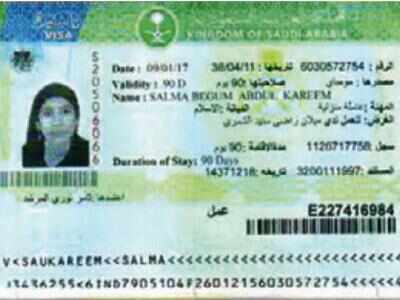- News
- India News
- Hyderabadi woman 'sold and tortured' in Saudi Arabia, Sushma intervenes
Trending
This story is from April 24, 2017
Hyderabadi woman 'sold and tortured' in Saudi Arabia, Sushma intervenes
External affairs minister Sushma Swaraj has directed the Indian Embassy in Saudi Arabia to rescue a Hyderabadi woman who was reportedly tricked and 'sold and tortured' in the middle-eastern country.

Salma Begum went to Saudi Arabia on a migrant worker's visa.
NEW DELHI: External affairs minister Sushma Swaraj has directed the Indian Embassy in Saudi Arabia to rescue a Hyderabadi woman who was reportedly tricked and 'sold and tortured' in the middle-eastern country.
Citing a TOI report highlighting the plight of Salma Begum, a resident of Hyderabad who is currently trapped in Saudi Arabia, Swaraj has asked for a report from the Indian embassy on the matter.
She has also asked them to secure Salma's release and ensure her expeditious return to India.
"I have asked Indian Embassy in Saudi Arabia to rescue and repatriate her (Salma Begum) to India at the earliest," Swaraj tweeted on Monday.
39-year-old Salma Begum was allegedly sent to Saudi Arabia by two agents identified as Akram and Shafi on a housemaid visa in January this year. Financial woes and debts drove Salma to the foreign land.
But her dream of a bright future turned into a horrific nightmare, when her kafeel (sponsor) in Saudi Arabia began exorting her for marriage. When she refused, he subjected her to mental and physical harassment.
Salma managed to get a message across to her daughter, in which she claims that the two agents sold her to the kafeel for Rs 3 lakh, besides detailing the tortures she suffered at the hands of her sponsor.
In the audio message, she also appealed to the Indian government to bring her back to India.
Swaraj has also urged Protector General of Emigrants M C Luther to take action against the agents who sent Salma to Saudi Arabia.
The GCC countries -Bahrain, Kuwait,Oman,Qatar, Saudi Arabia and UAE - manage its "temporary" migrant workforce through the sponsorship or Kafala system. Under this system, a local citizen or local company (the kafeel) must sponsor foreign workers in order for their work visas and residency to be valid. This means that an individual's right to work and legal presence in the host country is dependent on his or her employer, rendering him or her vulnerable to exploitation.
In most GCC states, migrants cannot leave or enter the country without their employer's permission.
Citing a TOI report highlighting the plight of Salma Begum, a resident of Hyderabad who is currently trapped in Saudi Arabia, Swaraj has asked for a report from the Indian embassy on the matter.
She has also asked them to secure Salma's release and ensure her expeditious return to India.
"I have asked Indian Embassy in Saudi Arabia to rescue and repatriate her (Salma Begum) to India at the earliest," Swaraj tweeted on Monday.
39-year-old Salma Begum was allegedly sent to Saudi Arabia by two agents identified as Akram and Shafi on a housemaid visa in January this year. Financial woes and debts drove Salma to the foreign land.
But her dream of a bright future turned into a horrific nightmare, when her kafeel (sponsor) in Saudi Arabia began exorting her for marriage. When she refused, he subjected her to mental and physical harassment.
Salma managed to get a message across to her daughter, in which she claims that the two agents sold her to the kafeel for Rs 3 lakh, besides detailing the tortures she suffered at the hands of her sponsor.
In the audio message, she also appealed to the Indian government to bring her back to India.
Swaraj has also urged Protector General of Emigrants M C Luther to take action against the agents who sent Salma to Saudi Arabia.
The GCC countries -Bahrain, Kuwait,Oman,Qatar, Saudi Arabia and UAE - manage its "temporary" migrant workforce through the sponsorship or Kafala system. Under this system, a local citizen or local company (the kafeel) must sponsor foreign workers in order for their work visas and residency to be valid. This means that an individual's right to work and legal presence in the host country is dependent on his or her employer, rendering him or her vulnerable to exploitation.
In most GCC states, migrants cannot leave or enter the country without their employer's permission.
End of Article
FOLLOW US ON SOCIAL MEDIA










